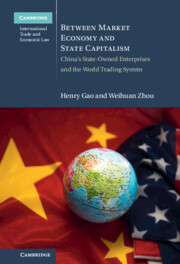 Between Market Economy and State Capitalism
Between Market Economy and State Capitalism Book contents
- Between Market Economy and State Capitalism
- Cambridge International Trade and Economic Law
- Between Market Economy and State Capitalism
- Copyright page
- Contents
- Figures and Tables
- Foreword
- Preface and Acknowledgements
- Table of Cases
- Abbreviations
- 1 China, State Capitalism and the World Trading System
- 2 The Evolution of China’s Reforms of State-Owned Enterprises (1978–2020)
- 3 State Capitalism in China’s Accession to the WTO
- 4 The Limits of General WTO Rules
- 5 The Potential of WTO Rules on Industrial Subsidies and China-Specific Obligations
- 6 Emerging Approaches to Regulating State-Owned Enterprises
- 7 Tackling China’s State Capitalism
- 8 Conclusion
- Index
6 - Emerging Approaches to Regulating State-Owned Enterprises
The Comprehensive and Progressive Agreement for Trans-Pacific Partnership (CPTPP) and Post-CPTPP Free Trade Agreements
Published online by Cambridge University Press: 10 November 2022
- Between Market Economy and State Capitalism
- Cambridge International Trade and Economic Law
- Between Market Economy and State Capitalism
- Copyright page
- Contents
- Figures and Tables
- Foreword
- Preface and Acknowledgements
- Table of Cases
- Abbreviations
- 1 China, State Capitalism and the World Trading System
- 2 The Evolution of China’s Reforms of State-Owned Enterprises (1978–2020)
- 3 State Capitalism in China’s Accession to the WTO
- 4 The Limits of General WTO Rules
- 5 The Potential of WTO Rules on Industrial Subsidies and China-Specific Obligations
- 6 Emerging Approaches to Regulating State-Owned Enterprises
- 7 Tackling China’s State Capitalism
- 8 Conclusion
- Index
Summary
Chapter 6 provides a critical evaluation of the new rules on SOEs developed in international trade and investment agreements, with the CPTPP as the leading example. Despite its reputation as a ’twenty-first century high-standard trade agreement’, we argue that the SOE rules in the CPTPP do not add much to the existing rules in the WTO and are less rigorous than China’s WTO-plus obligations discussed in Chapter 5. This chapter then examines some major post-CPTPP trade and investment agreements with significant rules on SOEs, including the EU–Japan FTA, the EU–Vietnam FTA, the United States–Mexico–Canada Agreement (USMCA) and the CAI. As one of China’s latest international agreements, the CAI is also the first treaty where China agreed to SOE rules outside the WTO. Again, the main substantive obligation here – the one on commercial considerations – simply repeats the existing obligation in China’s WTO accession package. While all of the FTAs discussed in this chapter should be praised for setting new and higher standards of transparency, they do not resolve the longstanding problem of enforcement – the most challenging issue under the WTO’s transparency regime.
Keywords
- Type
- Chapter
- Information
- Between Market Economy and State CapitalismChina's State-Owned Enterprises and the World Trading System, pp. 127 - 153Publisher: Cambridge University PressPrint publication year: 2022
- 1
- Cited by


